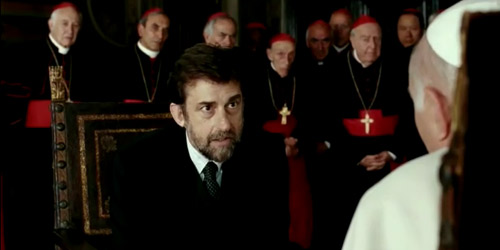
Habemus Papam
|
This is a film that opens up many a can of worms. I would like to ask Nanni Moretti if this is a good enough reason for making a useless film. It should be a controversial but the direction subtly disguises this intent - by making it jovial. So it appears sensitive and personal but the Papacy is a heavyweight thing and in making it lightweight, the episodes described in the film begin on a false premise. There may not be rules as such in art but this doesn't mean that one can ignore representational conventions. To take an example from music, one can compose a violin sonata whichever way one wants but the violinist must have some mastery over the workings of the instrument otherwise the 'true' note cannot be played and no enjoyment of the music can be conveyed. In drama, the action must be believable otherwise no idea nor emotion can be conveyed, that is, in art truth is not a rule but a necessity. A dramatist need not adhere as rigourously as a musician to rules but he must nonetheless do what is necessary in order to be believed. A dramatic work is a waste of time if it is not made such that an audience can hook on to the idea that what is being presented is within the realms of possibility - either at the dramatic level of human relationships or at the factual level of social principles. Nanni Moretti does us a great disservice by forcing us to believe that the cardinals will elect a stupid man for a Pope. Principles of faith are such that this event is outside the realms of possibility and Nanni Moretti's problems begin and end there. In ignoring religious tenets which formed the basis of his story, he has risked exposing himself as a somewhat shallow filmmaker. After the warm reception from the audience at its Cannes film festival screening that made Nanni Moretti break into tears, it was politely ignored by the jury and quite rightly so. |
Rome, 25 5 2011